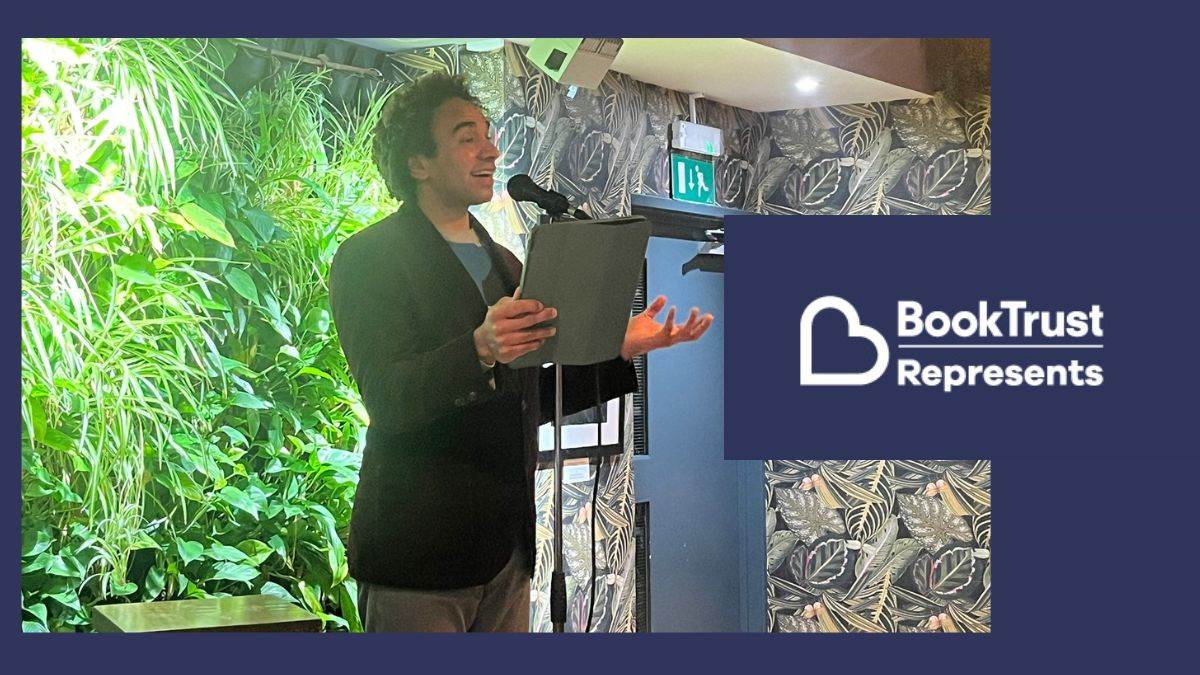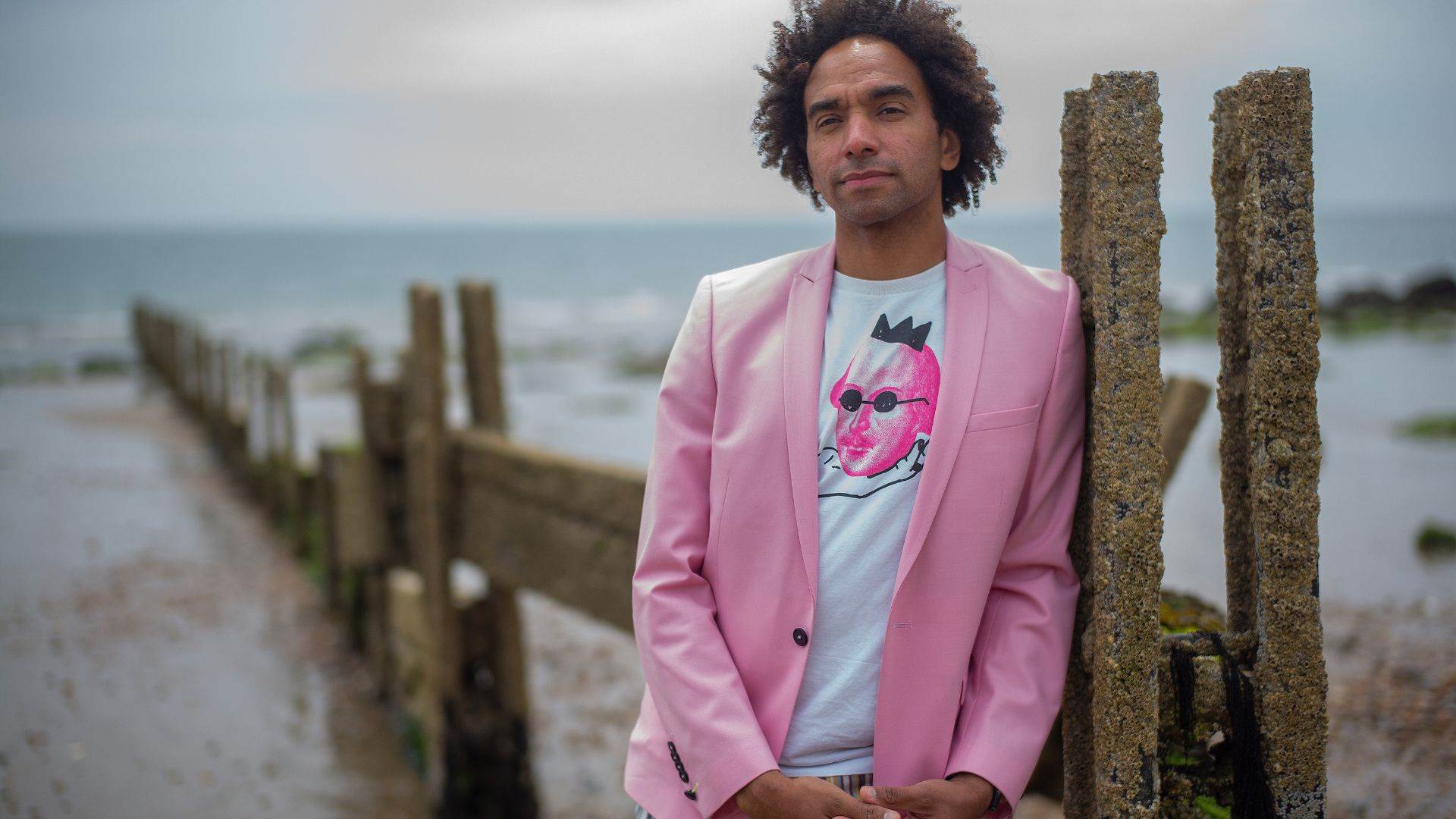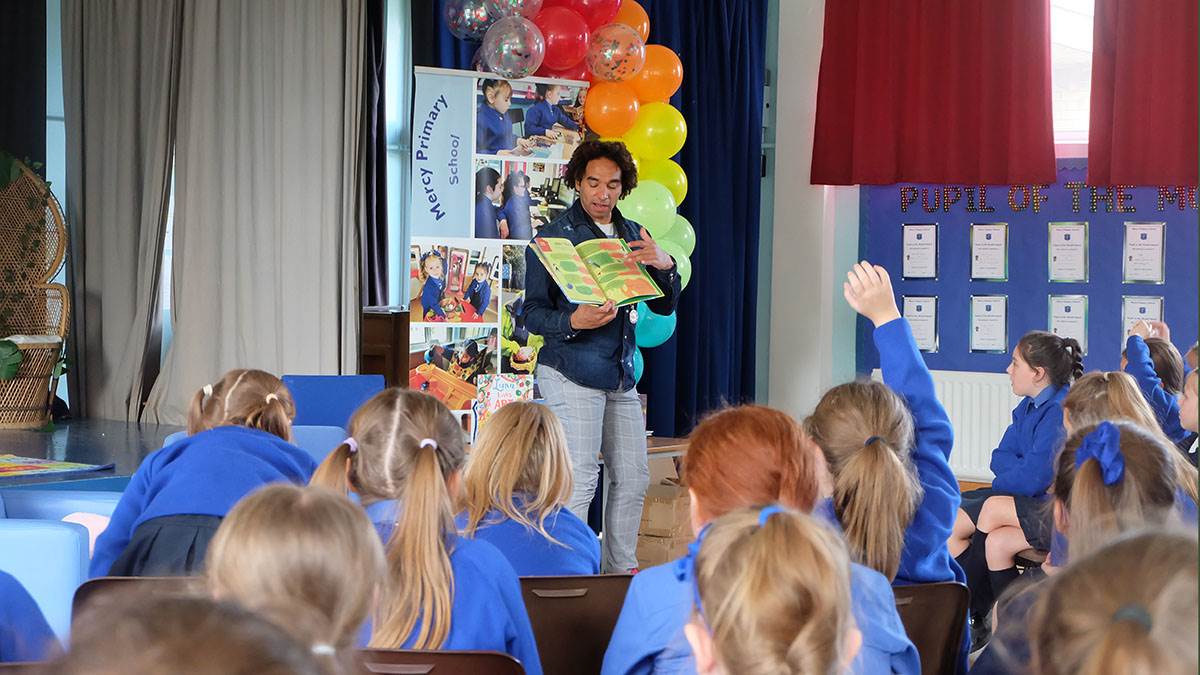Why author visits to schools matter
Published on: 28 November 2022
Waterstones Children’s Laureate Joseph Coelho's speech, read on the 24th November 2022 at The Arboretum for the BookTrust Represents Report Launch

It is a complete honour to get to speak to you all today for the launch of the latest BookTrust Represents report. School visits and their importance is something that is highlighted in the report and I want to share some of my experiences in this realm as a child, as a visiting unpublished poet and as a published author. But first I want to share an experience that ties into the importance of book diversity and author visits.
I recall a Zoom call, talking about a project that involved a longlist; it was a great longlist, a diverse longlist, except there were no males of colour on that list. It was an unconscious oversight.
So, prior to the meeting I had researched the many talented males of colour in the relevant sector to add to this longlist. My proposals were listened to, I felt supported and confident that the right, necessary changes would take place. Yet despite the meeting going well, despite being supported and listened to, afterward I noticed that my heart rate was up, that I could feel adrenaline coursing through my body. I was having a stress response.
Despite the fact that I am a 42-year-old adult who has had to have these conversations many times behind the scenes, there is still a little boy in me who dreads these conversations.
They are another reminder that maybe I don't belong, that I’m operating in a world where inclusion of people that look like me is not automatic, is not a given and my body remembers, my body interprets moments like these as threats, my amygdala flares up and tells my body I’m not safe, and so I have a stress response.
These little stress responses are very familiar to minorities and they can build up, and fester, and if left unchecked can result in illness, both mental and physical. It struck me whilst thinking about what I was going to say today that there is a thread of narrative between these kinds of stresses that minorities regularly feel and the sense of inclusion that we get when we are young.
The importance of representation in culture

I never saw people like me in books until well into my late GCSEs, and that was through reading Toni Morrison’s Beloved and then her other work like Tar Baby and The Bluest Eye. I was reading about people of colour in a very different context to my own, in a land and a time far away. That was the closest I got to representation and it was quite late into my schooling. Books, film, TV did not include me: a black bi-racial working-class Londoner.
My secondary school was great - it was a school of hard-knocks but it was having a bit of a rebrand when I was studying there. We had some wonderful teachers. I remember having an author visit by Brian Jacques, author of books like the Redwall series. Brave author that he is, he even had lunch with some of us students. He made a note of our names and told us that our names might appear in his books and so I read his books convinced that one day I would see a rabbit called Coelho! Alas, I never did, but his visit got me intrigued about his work.
As a result of his author visit I read his books. But I never made the connection that I could be a writer. Being a writer was for others, for people like Brian Jacques or the other authors that I was aware of at the time: authors like... Roald Dahl, Dr Seuss, Steve Jackson.
In my mind the thought did not even arise that I could be a writer. Why would it? People like me didn’t do things like that. The models I was seeing for what makes an author did not include me.
But in Sixth Form, that all changed. The wonderful Jean 'Binta' Breeze came to my school to do an author visit. She was a successful writer and a brilliant performer. She sat on our school stage and read a poem and my entire class was spellbound.
That’s when the thought occurred that I could be a writer. That was the first time I saw a writer who looked a bit like me. I had the thought that I could be a poet and so, I started writing poetry. I felt like I had permission to do so, I felt like it was possible.
It took many more instances like this throughout my early twenties meeting other poets and writers who I shared a narrative with, people who looked like, people who looked nothing like me but spoke like me, people who didn’t speak like me but understood where I had been, people like Jacob Sam La Rose and Aoife Mannix, and Malika Booker and Francesca Beard and Lemn Sissay for my horizons to be populated with possibility.
I could be a writer like Jacob, I could write spoken word shows like Lemn, I could be published like Malika... bit by bit through seeing examples of wonderful writers hustling and creating, I was able to slowly place myself in the picture. The models I was seeing included me and all the different facets, including race but also beyond it, that make me... me.
The power of school visits - for children and creators

When I first became aware of performance poetry organisation Apples and Snakes, an organisation that actively places poets in schools in educational contexts, all I wanted to do was to be a poet visiting schools, writing poems and getting kids to write.
I knew that was possible – I had seen other poets carve out very successful careers for themselves doing just that. If I could do that I could quit my various jobs as transport planner and theatre dogsbody and, during a very dark period, tequila boy! I started to devise ways to get kids writing because by helping them to write, I got to write, I got to share my words.
School visits enabled me to hone my writing skills, they gave me an income connected to my craft and, more importantly, they gave me a hunger to be published. There are very few things more motivating than the crestfallen look of a child when you tell them, 'No, I don’t have a book with my poems in.'
I wanted to give those children the experience I had when meeting Jean 'Binta' Breeze. I wanted to inspire them and so I had to get published... and twelve long, loooong years later, I did.
Going into schools as a published author was very different to going in as an unpublished performance poet. The way the teachers treated me was often very different, the way the kids would respond when I held up my one book was also very different.
The questions the children asked were very different: How do you get published? How are books made? Do you illustrate your books? Did anyone support you in your writing? Where can I send my stories to get published? And, of course, the classic questions... Are you rich? Are you married? And where did you get your trainers from?
I could feel the very palpable impact I was able to have as a visiting author.
On a couple of occasions, I have been privileged to see an elect mute child, a child who does not speak, choose to share their voice for the first time in a poetry session. The first time it happened was in a class where I was working on a long-term project, coming in weekly to create poems with the kids, and on my last day there a little boy, who looked a bit like me, an elect mute, put his hand up to read his poem.
His TA told him to put his hand down, saying to me, 'He won't say anything.' Luckily his teacher dived in, saying, 'If he wants to read his poem, let him', and this little boy walked to the front of his class and he read his poem... and his teacher wept.
Now, of course that happened in a context where teachers and TAs had been working with the child over weeks, months, maybe years to nurture his voice, but what I learnt from that experience was that author visits create a space in the school day, a new exciting space where new and exciting things can happen, where children can be seen differently not only by the guest author, but also by their classmates and teachers.
It also becomes a time that a child can see themselves differently, like I did when Jean 'Binta' Breeze came to visit, like the child did when he decided that he could be someone who could read a poem out loud.
Author visits create a clearing within the forest of the school for all the seeds planted and nurturing of the soil done by school educators to bloom.
School visits can help create these little moments of horizon-widening, but only if we have a diverse pool of authors and illustrators and poets, a pool that reflects the children we go to visit, a pool that truly reflects the society we live in.
Through these small but powerful interactions we can help create a future where our children do not have to suffer the million little stress responses of feeling they are operating in a world that doesn’t include them; where, instead, they spend that precious time and energy not in worry but instead in wonder, not scared but thrilled, not questioned but questioning, not doubting themselves but believing in themselves and in their own limitless horizons.
